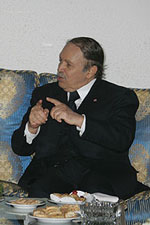Algerian authorities step up harassment of print media
Speaking on behalf of Bouteflika, who is ailing, presidential adviser Benamar Zerhouni said: "I note that pseudo-politicians, supported by a press that has no thought for professional ethics, seek day and night to scare and demoralize this people and undermine its confidence in the present and future, a people that has not and will not give any credence to their nonsense."
The address was delivered in Ghardaïa, 600km south of Algiers, on 19 March, celebrated as Victory Day in Algeria.
The fact that this comment appeared only in the French-language version of the speech and was later omitted from a government dispatch suggests that it was not drafted by the president himself and was added by aides.

Writing in the daily El-Watan in June 2014, journalist Abderezak Merad described "a plan to harass and weaken the media(...) devised at the highest decision-making level, meaning the very closed circle around the president, which alone decides on destabilization strategies and then executes them."
"This comment attributed to the Algerian president will fuel concern about an increase in the harassment of journalists and will inevitably worsen the situation for media personnel," Reporters Without Borders programme director Lucie Morillon said.
"On 3 May 2014, World Press Freedom day, President Bouteflika undertook to ensure that freedom of expression and media freedom are exercised 'without any pressure, supervision or restriction.' However, it is clear that the difficulties for journalists have increased since he began his fourth term."
There are many examples. Last November, Reporters Without Borders issued a statement deploring the fact that journalist Abdessami Abdelhaï had been held for the past 19 months without any date being set for his trial.
Mohamed Chergui, a journalist who used to work for El Djoumhouria, was sentenced in absentia in February to three years in prison and a fine of 200,000 dinars for "attacking the Prophet."
Boualem Goumrassa, a correspondent for the London-based Saudi newspaper Asharq Al-Awsat, was stripped of his press card early this month without any valid reason being given. Referring to this decision, communication minister Hamid Grine said foreign media should "respect the rules of the game" but did not elaborate.
SIA, an Algiers printing firm, has stopped printing the Arabic-language daily El Fajr in a move that publisher Hadda Hazem, in a comment to Reporters Without Borders, described as a political sanction.
Many publications are under constant financial pressure. Shortly before the April 2014 presidential election, the National Publishing and Advertising Agency (ANEP) withdrew state advertising from two dailies, Algérie News and El-Djazair News, after their publisher publicly opposed Bouteflika's reelection.
The media are also being pressured by the private sector. Joseph Ged, the CEO of the privately-owned mobile phone company Oreedo, recently threatened to stop placing advertising with newspapers that "attack Algeria or Qatar."
Algeria is ranked 119th out of 180 countries in the 2015 Reporters Without Borders press freedom index.
This statement was originally published on rsf.org on 25 March 2015, and is republished here via IFEX
















